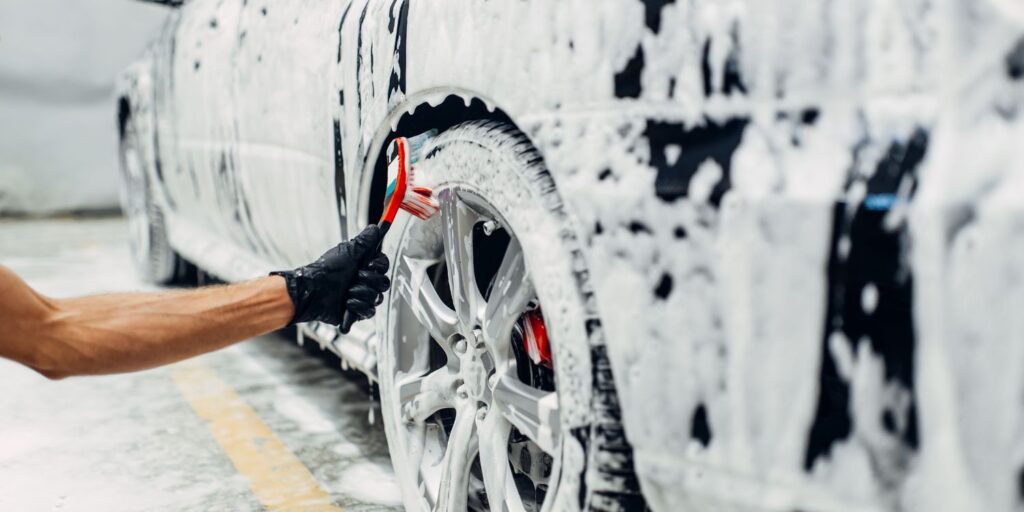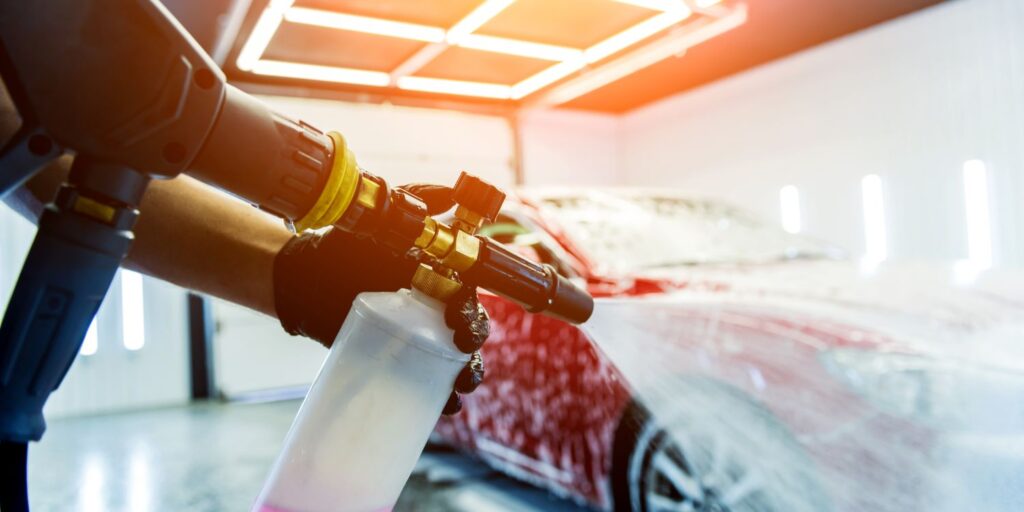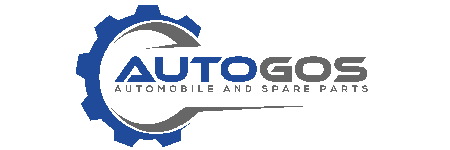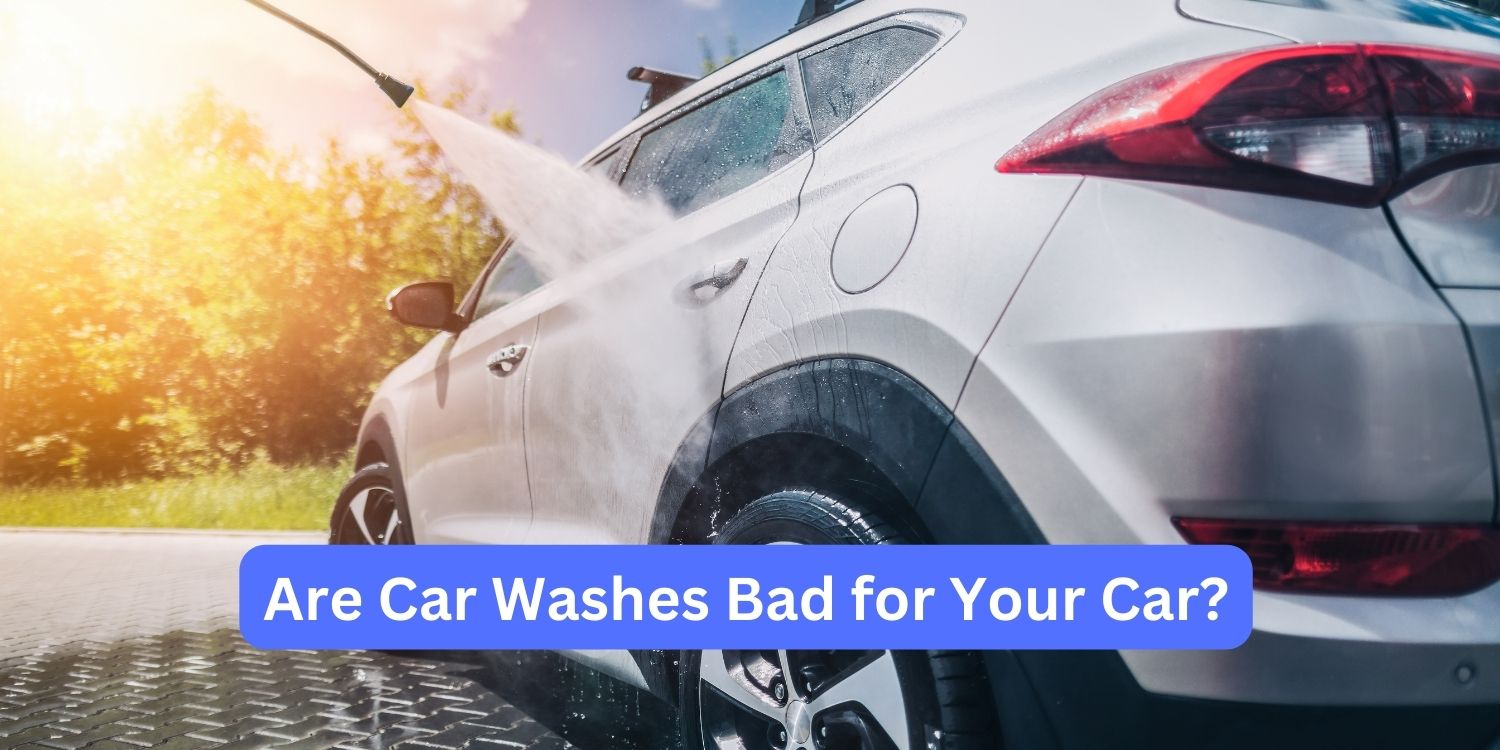Maintaining the exterior of your car is crucial not only for aesthetics but also for preserving its value and longevity.
However, with numerous options available for cleaning your vehicle, including automatic car washes, hand washing, and DIY methods, it’s essential to understand which is best for your car’s well-being.
Car owners often debate whether car washes benefit or harm their vehicles. While regular washing is essential for maintaining a car’s appearance and longevity, concerns about potential damage linger in the minds of many.
Let’s explore the various aspects of car washing to determine whether it harms your car’s well-being.
Types of Car Washes
Three types of car washes are available, each with its pros and cons.
Automatic Car Washes
Automatic car washes offer convenience and speed, but some worry about the potential for damage due to the mechanical brushes and harsh chemicals used.
However, concerns have been raised regarding the potential damage they may cause to the car’s exterior. Let’s explore the pros and cons:
Pros
Let’s discuss the pros of automatic car washes.
1. Convenience
Automatic car washes are quick and require little manual labor, making them an attractive option for busy car owners.
2. Efficiency
These car washes utilize high-pressure jets and specialized cleaning agents to remove dirt and grime effectively.
3. Consistency
With automated systems, you can expect consistent cleaning results every time, ensuring a uniformly clean exterior.
Cons
Let’s discuss the potential drawbacks of automatic car wash
1. Abrasive Materials
Some automatic car washes employ brushes and materials that may be too abrasive for particular vehicle finishes, leading to scratches and swirl marks.
2. Lack of Personalization
Automated systems may not cater to specific areas of your car that require special attention, such as delicate paintwork or intricate detailing.
3. Potential Damage
In rare cases, the high-pressure jets and mechanical components of automatic car washes can cause damage to vulnerable areas, such as antennas, mirrors, or trim pieces.
Hand Car Washes
Hand washing your car provides a more personalized and gentle approach to cleaning, allowing you to address every surface and crevice carefully.

However, the quality of the wash largely depends on the skill and diligence of the workers. Let’s explore the pros and cons:
Pros
Let’s discuss the pros of automatic car washes.
1. Precision
Hand washing enables you to target areas requiring extra attention, such as rims, grilles, and intricate bodywork.
2. Control
Using your hands and specialized cleaning tools gives you greater control over the pressure and techniques, reducing the likelihood of scratches or damage.
3. Thoroughness
Hand washing allows you to thoroughly inspect your car’s exterior for any signs of damage or imperfections, enabling prompt repairs or maintenance.
Cons
Hand washing has its cons, including the time and effort required and the potential for improper techniques leading to swirling marks or scratches if not done correctly.
DIY Car Washing
Many car owners prefer the hands-on approach of DIY car washing, as it allows them to exert complete control over the cleaning process and use products of their choice.
While DIY methods offer a personalized touch they also have certain risks and considerations. Let’s explore the pros and cons:
Pros
Let’s discuss the pros of automatic car washes.
1. Personalization:
DIY car washing allows car owners to tailor the cleaning process to their preferences, choosing specific products and techniques based on their vehicle’s needs.
2. Cost-Effectiveness:
Washing your car at home can be more economical in the long run, eliminating the need for recurring expenses associated with professional car wash services.
3. Convenience:
For some, washing their car at home is more convenient than visiting a car wash facility, especially if they have the necessary equipment and space.
Cons:
Let’s discuss the potential drawbacks of automatic car wash
1. Lack of Equipment:
Properly washing a car requires specific tools and equipment, such as a pressure washer, foam cannon, and grit guards, which may only be readily available to some car owners.
2. Improper Techniques
DIY car washers may inadvertently use incorrect techniques or harsh cleaning agents without proper training and guidance, leading to paint damage or scratches.
3. Environmental Impact
Washing a car at home can contribute to water wastage and pollution if not done responsibly, as runoff containing soap, dirt, and contaminants may enter storm drains and waterways.
To mitigate these risks, car owners opting for DIY car washing should educate themselves on proper techniques and invest in quality cleaning products and equipment.
Additionally, implementing eco-friendly practices, such as using biodegradable soaps and capturing runoff water for responsible disposal, can help minimize the environmental impact of DIY car washing.
Are Car Washes Harmful to Your Car? Debunking Common Concerns
Several concerns surround the topic of car washes, contributing to confusion among car owners. Let’s debunk some of the most common:
Scratches and Swirl Marks
One of the primary worries is the possibility of scratches or swirl marks resulting from abrasive cleaning materials or improper techniques.
Water Spots
The formation of water spots, particularly if the car is not dried thoroughly after washing, can mar the paint surface.
Damage to Paint and Wax
Frequent washing may strip away protective wax layers or damage the paint, leaving the car vulnerable to corrosion.
Effectiveness of Car Washes
The effectiveness of a car wash largely depends on the techniques and equipment used.
Environmental Considerations
Regarding potential damage to the car, there are also environmental considerations associated with car washing.
Tips for Safe Car Washing

Regardless of the method you choose, following these tips can help ensure a safe and effective car washing experience:
1. Use a pH-balanced car shampoo to avoid stripping away protective coatings or damaging the paintwork.
2. Use separate wash mitts or sponges for different areas of the car to prevent cross-contamination and scratches.
3. Rinse your car thoroughly before washing to remove loose dirt and debris, reducing the risk of scratching the paint.
4. Dry your car using a soft, microfiber towel to prevent water spots and streaks.
5. Regularly wax your car to protect against environmental contaminants and UV damage.
FAQS
Some frequently asked questions about Washing cars are :
Are automatic car washes safe?
Yes, but it depends on the facility. Look for ones that use gentle cleaning methods to minimize potential damage from abrasive materials and harsh chemicals.
What are the benefits of hand car washes?
Hand washing offers precision and control, allowing thorough inspection and targeted cleaning of specific areas for a meticulous result.
Is DIY car washing a good option?
It can be, but proper equipment, techniques, and environmental considerations are essential to avoid damage and pollution.
What are the common concerns about car washes?
Worries include scratches or swirl marks, water spots, damage to paint and wax, and the effectiveness of different methods.
How can I wash my car safely?
Follow tips such as using pH-balanced products, separate wash mitts, thorough rinsing, gentle drying, and regular waxing for a safe and effective wash.
What’s the bottom line of car washes?
Choose the method that suits you best, understand the risks, and follow safe practices for maintaining your car’s appearance and integrity.
Final Words
In conclusion, the debate over the impact of car washes on your car’s well-being involves weighing the benefits and drawbacks of various washing methods.
Automatic car washes offer convenience but may risk damage due to abrasive materials, while hand washing provides precision and control, albeit with added time and effort.
DIY car washing allows for personalization and cost-effectiveness yet poses potential risks like improper techniques and environmental impact.
Understanding these factors empowers car owners to make informed decisions and adopt safe washing practices, ensuring the maintenance of their vehicle’s appearance and integrity.
Ultimately, whether car washes are detrimental depends on the approach taken and the precautions exercised, underscoring the importance of responsible washing habits to preserve your car’s longevity while enjoying a clean and well-maintained vehicle.




